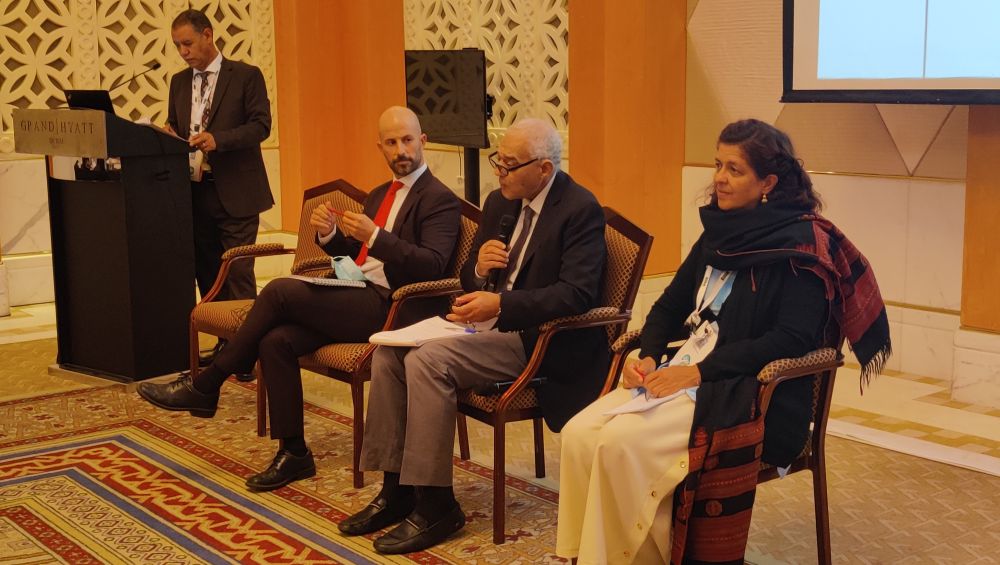Press Release: IWMI and AWC organize the First Regional Science-Policy Dialogue on water reuse in the MENA Region


The Dialogue convened high-level officials and scientists from all over the MENA region to reach a shared regional diagnosis of the state of water reuse and the key challenges to uncap the water reuse potential. A number of about 45 high-level officials, including Ministers, professionals and water community leaders participated in the Dialogue, representing the water, health, agriculture, and environmental sectors. The principal participating agencies were the International Water Management Institute (IWMI), the Arab Water council (AWC), the League of Arab States (LAS), FAO Regional Office for Near East and North Africa, CIHEAM-Bari Italy, SIDA, GIZ, the International Center for Biosaline Agriculture (ICBA) and the Arab Organization for Agricultural Development (AOAD), in addition to representatives of governmental and national organizations from Arab countries, including Egypt, Jordan, Lebanon, Syria, UAE, Oman, Bahrain, KSA, Morocco, Tunisia and Sudan.
The participants’ contribution and expertise added value to the deliberations of the event, the latter being considered a milestone in the run-up to the 9th World Water Forum to be held in Dakar, Senegal, in March 2022. Discussions reflected local experiences in certain countries and that some reuse issues had more than one way to look at, depending on country implementation.
The Dialogue was an interactive one-day workshop on the second day of the Arab Water Forum, with presentations, open discussions and interactive working groups.
The water resources in the region are increasingly scarce and polluted, with major consequences on human and economic development. “The ReWater MENA” project seeks to contribute to address this challenge by promoting more and safer water reuse” emphasized Dr. Nisreen Lahham, ReWater Project Manager, during the introduction of the event. “The project follows a participatory approach, where Learning Alliances are initiated in three countries (Egypt, Jordan and Lebanon) and key stakeholders are engaged, trained, and connected in a network to accelerate the replication of locally viable reuse solutions”.
“Wastewater is still an untapped resource in the MENA region”, highlighted Javier Mateo-Sagasta, ReWater Project Leader. “From the more than 18 km3 of nutrient-rich municipal wastewater that is produced in the Arab countries in MENA, up to 50% is lost with no productive use, and where there is productive reuse, it is frequently indirect, unintentional and not safe enough”. Key challenges to uncap the water reuse potential include cultural barriers and distrust, institutional fragmentation, and improper regulations and lack of cost recovery mechanisms to ensure financial sustainability of projects.
Participants debated on solutions to address these and many other obstacles to investigate the water reuse potential in the region. These solutions included adapting to fit-to-purpose technologies; adopting a cost-recovery plan with Research and Development; inclusive targeted awareness campaigns (media, school curricula); reviewing existing, updating, issuing standards and guidelines; building trust through the early involvement of the end users; and encouraging public private partnership (PPP).
With respect to key messages, the Dialogue output showed the importance of implementation of the solutions mentioned above in terms of adopting cost recovery plans, allocating budget for research and development, initiating a mass media campaign and issuing revised standards and guidelines.
Specific top priority actions were recommended as withdrawn and quoted from the participants’ interactive discussions to be implemented in the next six months. However, discussions showed that the timeframe for applying solutions may differ from one country to the other.

As concluded by Dr. Hammou Laamrani, the Senior Expert at LAS, “the Dialogue outcomes are expected to bring about pioneering out-of-the-box knowledge, experiences and values that will be a guiding roadmap towards a more prosperous future for the Arab region and worldwide.”
H.E. Dr. Hussein El-Atfy, AWC Secretary-General, expressed that “in appreciation of the valuable outcomes of the workshop and the outlined roadmap and action steps, participants have eagerly emphasized that they are looking forward for the second Science-Policy Dialogue scheduled to take place in Cairo, Egypt, in early 2022, to build on the outputs of the first one, being further informed by key success stories on water reuse in the Arab region. He added that “the success of the dialogue is not just in getting all the stakeholders together to deliberate and exchange knowledge and views, but rather to leave an impact on the future of water reuse in the region. One way to do so is to make sure that the outcomes of the dialogue turn into an opportunity to set a strategic plan for implementing the solutions that the discussions have raised during the workshop.”
This Dialogue was a side event to the 5th Arab Water Forum (AWF), organized by the AWC in Dubai, United Arab Emirates from 21-23 September 2021, in the framework of “ReWater MENA” project, led by the International Water Management Institute (IWMI) and funded by the Swedish International Development Cooperation Agency (Sida), in partnership with the Arab Water Council (AWC), and in collaboration with the Food and Agriculture Organization of the United Nations (FAO) and the League of Arab States (LAS).
